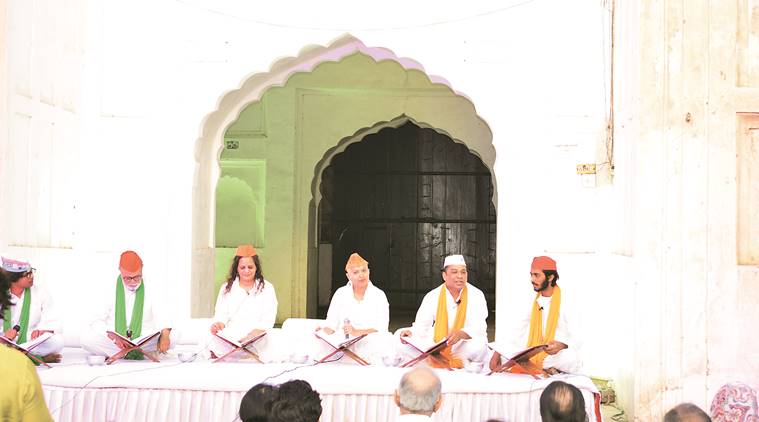 Topi Ki Dastaan in progress
Topi Ki Dastaan in progress
When, in future, I am asked what I, as an artist, was doing when forces of communalism were dividing people of my country, I will have an answer,” says Tarique Hameed, founder of the Delhi group, Wings Cultural Society, “I will say, ‘I was performing Topi ki Daastaan.’” The story of Hindu-Muslim relationship played out on Sunday against the backdrop of Mughal arches and jharokhas at a 328-year-old venue that is, today, the Anglo Arabic Senior Secondary School, near Ajmeri Gate in Old Delhi. It was organised by Purani Dilli Walo Ki Baatein as part of an initiative to revisit salient features of the historic neighbourhoods. Topi ki Daastaan is adapted from a Hindi novel, Topi Shukla, by Rahi Masoom Raza, and revolves around two boys, the eponymous Brahmin protagonist and his friend, Iffan, a Muslim.
The boys bond over cycles and grandmothers’ stories before their friendship is tested by the vicious cleaver of the Partition. Hameed, the director of the piece, has woven in contemporary political references and commentaries that give the story a sharp satirical edge. “If there is a lotus symbol on a topi, the wearer looks to be a BJP supporter, a cycle symbol means the person is Samajwadi and, if there is a broom drawn on the cap, toh aadmi aam dikhayi deta hai,” said Hameed, who played the narrator and Topi, “No such topi has been created till now that means the wearer is Indian. This is because, to be Indian or to look Indian, you don’t need to wear a cap.”
The faulty sound system caused frequent disruptions but, as the faithful gathered for evening prayers at the old mosque opposite the performance space and birds chirped on their way to roost, the six performers on stage painted aural scenes of the times, especially the age of innocence when Topi visits Iffan’s house and declares, “We don’t eat anything touched by miyans”. Subsequently, Topi begins to question the formation of Pakistan as he becomes an embodiment of the chaos of post-Independent India. “We are not here to talk about how Hindus and Muslims are bhai-bhai. Why should we be so bewakoof?” asked Hameed during the performance, “Do we daily tell our elder or younger brother that we are bhai-bhai?”